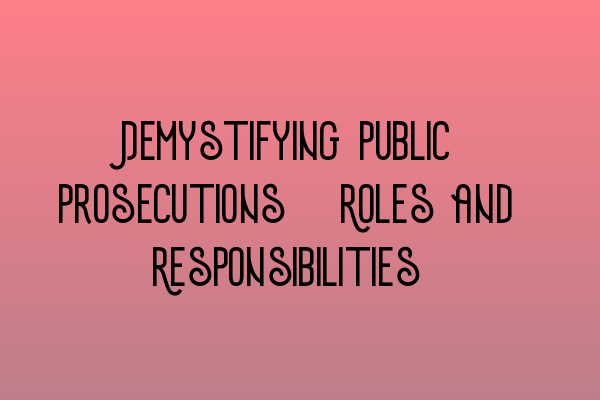Demystifying Public Prosecutions: Roles and Responsibilities
Welcome to the blog of SQE Criminal Law & Practice Law UK! In this post, we aim to demystify the intricate world of public prosecutions by discussing the various roles and responsibilities involved. Whether you are studying for the SQE 1 or SQE 2 exams, or simply have an interest in criminal law, this article will provide you with valuable insights.
The Public Prosecutor: An Overview
The public prosecutor, also known as the Crown Prosecutor or Crown Advocate, is a pivotal figure in the criminal justice system. Their primary role is to represent the public interest by prosecuting individuals accused of committing criminal offenses. The prosecutor acts on behalf of the state and seeks to ensure that justice is served.
When a criminal offense is reported to the police, it is the public prosecutor who determines whether there is enough evidence to proceed with a prosecution. They assess the strength of the case based on the available evidence and legal considerations.
Once the decision to proceed is made, the public prosecutor takes on the responsibility of preparing the case for court. This involves gathering evidence, interviewing witnesses, and consulting with experts in relevant fields. The prosecutor must ensure that all relevant information is presented accurately and fairly during the trial.
The Role of the Defense Counsel
In the adversarial system, the defense counsel represents the accused individual. Their role is to challenge the evidence presented by the prosecution and raise any legal defenses on behalf of their client. Defense counsel plays a crucial role in safeguarding the defendant’s rights and ensuring a fair trial.
During a public prosecution, the defense counsel has the right to cross-examine prosecution witnesses, present their own evidence, and make legal arguments to support their client’s case. Their objective is to cast doubt on the prosecution’s case and secure an acquittal or a reduced sentence for their client.
It is important to note that defense counsel may also negotiate with the public prosecutor for plea bargains and alternative resolutions to the case. These negotiations aim to find a mutually agreeable outcome that serves the interests of justice.
SQE 1 Practice Mocks FLK1 FLK2
The Judiciary and Their Role
The judiciary, which includes judges and magistrates, plays a crucial role in public prosecutions. They ensure that trials are conducted in a fair and impartial manner, making decisions based on the evidence presented and the applicable laws.
During a trial, the judge ensures that the proceedings follow the rules of evidence and that both the prosecution and defense have a fair opportunity to present their case. They also give directions to the jury, if applicable, to assist them in reaching a verdict based on the evidence.
Judges have the authority to determine the admissibility of evidence, rule on legal objections, and sentence convicted individuals. Their role is integral to upholding the principles of fairness and justice in the criminal justice system.
The Jury: Fact-Finders in Trial
In criminal trials, the jury plays a vital role as the finders of fact. The jury listens to the evidence presented by both the prosecution and the defense and decides whether the accused individual is guilty or not guilty.
Jurors must be impartial and base their decision solely on the evidence presented in court. They are required to apply the law as directed by the judge to the facts of the case.
The decisions made by juries contribute significantly to the outcomes of criminal trials, ensuring that justice is served according to the standards set by the community.
In Conclusion
It is important to understand the various roles and responsibilities involved in public prosecutions to appreciate the complexities of the criminal justice system. The public prosecutor, defense counsel, judiciary, and jury each play distinct roles in ensuring that justice is served in accordance with the law.
If you are preparing for the SQE 1 or SQE 2 exams, we recommend checking out our related articles on:
– SQE 1 Practice Exam Questions
– SQE 1 Practice Mocks FLK1 FLK2
We hope this article has provided valuable insights into the roles and responsibilities in public prosecutions. If you have any further questions or would like to know more about criminal law, do not hesitate to contact SQE Criminal Law & Practice Law UK.
